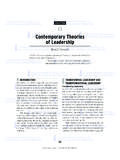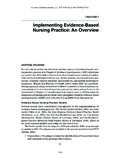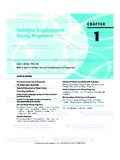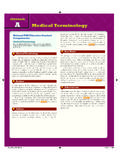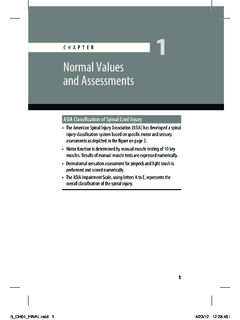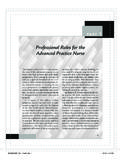Transcription of Administrative Ethics: Ideas, Sources, and Development
1 Filling in the content of Administrative ethics will proceed in two stages. In the first stage, we will define ethics in general and Administrative ethics in particular and examine the prevailing or conventional model of ethical thinking among public administrators. This is called the basic ethics model. Subsequently, the major approaches to ethics will be examined in more depth, and an advanced ethical model will be developed. The first questions pursued in this chapter are big ones. What is ethics , and how does Administrative ethics differ from other standards of behavior? Where do ethical standards come from? An important source of standards is philosophy and its major theories of ethics .
2 However, our discussion of the sources of ideas for Administrative ethics will focus initially on the ethics derived from the nature of the Administrative position itself; in other words, the standards and expectations that are based on a duty to serve the public. It will then be possible to consider how this duty-based ethics is linked to other approaches that draw on philosophi-cal arguments. Finally, it is important to consider how ethical thinking develops and the alternative levels of ethical reasoning. Not all persons think about ethics in the same way or have the same depth of ethical reasoning. The responses from other students who completed the pop quiz about what is or should be their code of ethics are linked to the sources and levels of their ethi-cal reasoning.
3 There is some direct evidence from the student responses as well as results from other research to justify the conclusion that the characteristics of the basic ethics model are widely held. If you have not completed the pop quiz, back-track to the introductory chapter before going further. This chapter concludes Administrative ethics : Ideas, Sources, and 111/15/2014 8:35:49 PMwith an examination of other key concepts and considers what ethics shares with morality and legality, and how it is different from these concepts. Definition anD the SourceS of ethical iDeaSA general definition of ethics follows: ethics refers to well-based standards of right and wrong that prescribe what humans ought to do, usually in terms of duties, principles, specific virtues, or benefits to This definition identifies four dimensions or sources of ethics , one based on the nature of public service and three based on the philosophical perspectives to ethics : 1.
4 Duties: The behaviors expected of persons who occupy certain roles; that is, the obligations taken on when assuming a role or profession 2. Virtues: Qualities that define what a good person is; moral excellence 3. Principles: Fundamental truths that form the basis for behavior; kinds of action that are right or obligatory (Frankena 1963, 49) 4. Benefits to society: Actions that produce the greatest good for the greatest number2 For persons who work in government and nonprofit organizations, duty has a special importance. They must serve the public, fulfill the expectations of public office, and be trustees of public resources. These are the actions required by their occupation or role independent of but reinforced by other ethical considerations.
5 The ethics of public administrators begins with and is grounded in duty. Duty is an old-fashioned term that at first glance may seem too narrow to be more than the starting point for developing Administrative ethics . In a narrow view, duty implies the restricted range of actions one is required to take without question, as in the phrase It is my duty . ethics implies a broader range of expected behaviors and reflection about what should be done, and definitions of duty can encompass such views. Duty means the action required by one s business, 1 Definition adapted from Andre and Velasquez (1987). They referred to rights, obligations, benefits to society, fairness or specific virtues.
6 2 For further explanation of approaches, see Cooper (2004).12 Chapter 2 Administrative ethics : ideas, sourCes, and 121/15/2014 8:35:49 PMoccupation, or function but also the action or behavior due by moral or legal obligation. 3 Thus, duty implies obligations, responsibilities, and meeting expec-tations that are imposed on the individual from outside sources. This is the tra-dition of external control that was promoted by Finer (1941), who argued that elected officials should exercise minute control over administrators. In this view, the most important duty is to obey authoritative orders. Duty, however, also entails choice on the part of the officials who accept the norms established by others and augment them with their own commitment.
7 Cooper (1982, 112) notes the following observation of Fritz Morstein Marx: Judicial redress, official liability, and the whole gamut of disciplinary measures are poor substitutes for a sense of duty. No formal device for accountability can give us a clue as to the components of answerable conduct. One cannot commandeer responsibility. One can only cultivate it, safeguard its roots, stimulate its growth, and provide it with favorable climatic , duty as an internalized set of values is the foundation for have also recognized the centrality of duty and seen it as an orientation that draws out a broad range of responsibilities.
8 For example, Mark Moore (1981, 5) distinguishes the narrow requirements from the broader possibilities in this statement: The duties of public officials are not simply to be passive instruments in policy-making but to work actively in establishing goals for public policy in their area, and in advocating those goals among the people who share their responsibility. In short, they have the opportunity and duty to conceive of and pursue the public , duty entails not only internalized standards but also the responsibility to take actions, such as making proposals or investigating problems, to advance the public good.
9 Public administration ethics is rooted in duty in the sense that persons who seek positions in government or nonprofit organizations (or who pursue educa-tional programs to prepare themselves for such positions) are commonly moti-vated by a sense of duty to serve, sometimes called the public service motivation (Perry and Wise 1990). They wish to help others, to benefit society, or to serve the public interest. The public service motivation is indicated by an attraction to policy making and the political process; commitment to the public interest/3 Definitions are from the New Shorter Oxford English Dictionary. definition and the sourCes of ethical ideas 131/15/2014 8:35:49 PMcivic duty, for example, doing what is best for the whole community ; com-passion or being moved by the plight of the poor ; and self-sacrifice that is indicated by a commitment to work for a cause bigger than myself or being prepared to make enormous sacrifices for the good of society (Perry 1997, 187).
10 The indicators are not ethical commitments in themselves, but they provide the basis for ethical values rooted in a bit more thought, one could identify ways that administrators should handle key relationships guided by duty. The relationships are the interactions with the public, with the organization of which one is a part, and with political superiors either elected officials (or their appointees) in government or boards of nonprofit organizations. Public administrators should not lie, withhold informa-tion, or put their own interests above serving the public. They should be account-able to their superiors and to the public. The point of these examples is simple: without even considering ethical theories or philosophy, it is possible to elaborate an extensive list of standards of right and wrong that prescribe what humans ought to do based on a sense of duty as a public servant.
